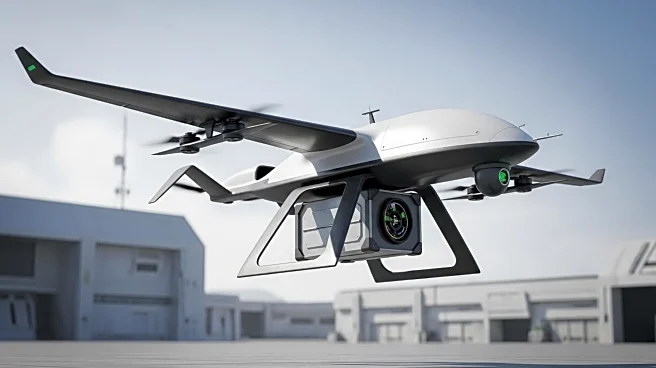What is the story about?
What's Happening?
Pyka, a California-based autonomous aircraft company, has introduced its DropShip unmanned aerial vehicle (UAV) designed for defense applications. The DropShip UAV offers modular payload configurations and focuses on precision airdrop capabilities. It boasts a ferry range exceeding 3,500 miles and a payload capacity of up to 550 pounds. The precision airdrop system can deliver supplies within 150 feet of a target. The aircraft supports both theater-scale operations and tactical resupply missions, capable of flying for up to 45 minutes in an all-electric, low-signature mode for covert operations. The system is designed for rapid deployment, transitioning from a standard 20-foot container to flight-ready status in under an hour, and can be operated by a single soldier.
Why It's Important?
The introduction of the DropShip UAV by Pyka represents a significant advancement in autonomous cargo delivery for defense forces. This technology addresses critical gaps in the market, such as the ability to transport goods without risking human lives and providing a cost-effective solution compared to traditional Group 4 unmanned aircraft systems. The UAV's capabilities enhance operational efficiency and safety, offering defense forces a reliable method for resupply and logistics in challenging environments. The potential for rapid deployment and precision delivery could transform military logistics, reducing dependency on human-operated transport and increasing mission success rates.
What's Next?
Pyka's DropShip UAV is expected to undergo further testing and evaluation by the U.S. Air Force and Army, following initial deliveries. As defense forces assess the UAV's performance, there may be opportunities for broader adoption and integration into military logistics operations. The success of these trials could lead to increased investment in autonomous UAV technology, potentially influencing future defense procurement strategies. Stakeholders, including military leaders and policymakers, will likely monitor the outcomes closely to determine the UAV's impact on operational capabilities and cost-effectiveness.
Beyond the Headlines
The deployment of autonomous UAVs like DropShip raises important ethical and legal considerations regarding the use of unmanned systems in military operations. As these technologies become more prevalent, discussions around the rules of engagement, accountability, and the potential for reducing human involvement in conflict zones will become increasingly relevant. Additionally, the environmental impact of transitioning to electric-powered UAVs could contribute to broader sustainability goals within the defense sector.















